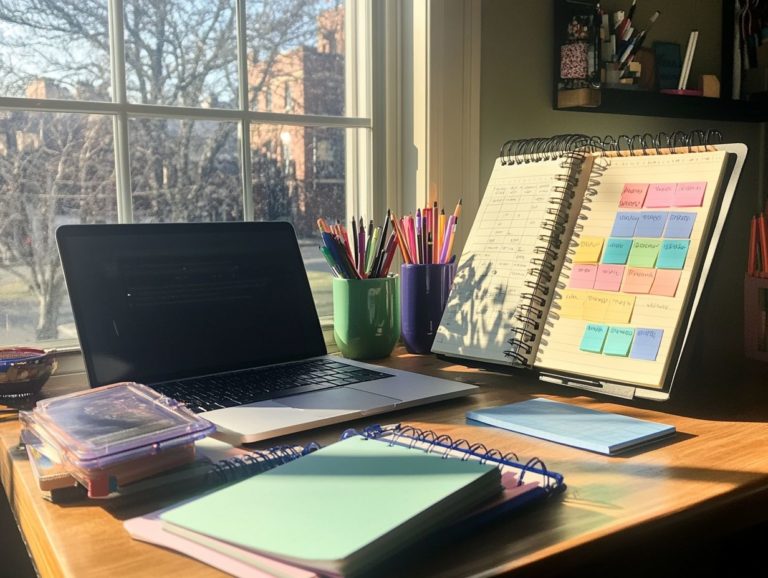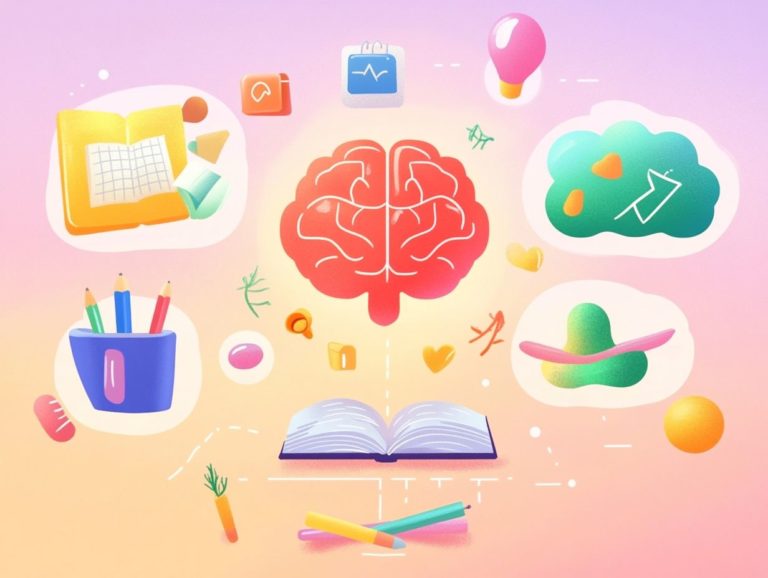5 tips to ace your next practice test
Preparing for a test can often seem daunting, but with the right strategies in place, you can elevate your confidence and performance to new heights.
This article presents five essential tips that will guide you in acing your next practice test. By developing a robust study plan, revisiting previous materials, mastering time management, and carefully analyzing your mistakes, each step is tailored to enhance your understanding and skills effectively.
Explore how implementing effective study techniques and creating a realistic testing environment can revolutionize your preparation, ultimately paving the way for your success.
Contents
- Key Takeaways:
- 1. Create a Study Plan
- 2. Review Past Material
- 3. Practice Time Management
- 4. Take Practice Tests in a Realistic Setting
- 5. Analyze Your Mistakes and Weaknesses
- Why Are Practice Tests Important for Test Preparation?
- How Can a Study Plan Improve Test Performance?
- What Are the Benefits of Reviewing Past Material?
- How Can Time Management Affect Test Scores?
- What Are the Best Settings for Taking Practice Tests?
- How Can Analyzing Mistakes Help Improve Test Scores?
- What Are the Most Effective Study Techniques for Test Preparation?
- How Can One Stay Motivated While Preparing for a Test?
- What Are the Most Common Mistakes to Avoid During Test Preparation?
- How Can One Overcome Test Anxiety?
- What Are the Benefits of Taking Multiple Practice Tests?
Key Takeaways:

Unlock your success! Here s how to prepare effectively for your practice test:
- Plan your study sessions.
- Review past materials.
- Master time management.
1. Create a Study Plan
Creating a well-structured study plan is crucial if you aim to elevate your exam performance and refine your study habits.
This plan helps you implement helpful preparation methods, enhancing both learning and retention.
A solid plan gives you the power to prioritize tasks based on deadlines and difficulty levels. This method can greatly reduce feelings of overwhelm, especially as exams loom on the horizon.
You can incorporate techniques like the Pomodoro Technique. This method involves working hard for a set amount of time and then taking a short break. Spacing out your study sessions over time can further reinforce knowledge retention in the long run.
Importantly, a flexible study plan can adapt to your unique academic goals and learning style, transforming it into a personalized tool for your success.
2. Review Past Material
Reviewing past materials is an essential part of your test preparation strategy. It helps reinforce your understanding while pinpointing key areas that might need a bit more attention.
You can elevate this process with various techniques. For example, summarization allows you to break down complex concepts into simpler, more manageable pieces, making the information easier to digest and remember.
The Feynman Technique is another powerful tool. By teaching concepts as if explaining them to someone with no prior knowledge, you deepen your comprehension even further.
Incorporating practice questions and retrieval methods enhances your recall and mimics real test conditions, helping to ease any anxiety you might feel.
By actively engaging with the material instead of merely consuming it, you forge stronger memory pathways, boosting the effectiveness of your study sessions.
3. Practice Time Management
Effective time management is essential for you as a student, directly influencing your study habits and exam performance.
By allocating sufficient time for each subject and task, you can navigate your responsibilities without succumbing to stress and anxiety.
Adopting practical techniques, such as creating realistic schedules that factor in your unique commitments, can significantly enhance your productivity.
Setting specific deadlines instills a sense of urgency, keeping you focused and accountable.
Utilizing tools like digital planners or productivity apps allows you to track assignments and upcoming exams effortlessly, giving you a clear overview of your priorities.
These strategies enable you to manage your workload more efficiently and help diminish feelings of overwhelm. In the end, this leads to improved overall performance in your academic pursuits.
4. Take Practice Tests in a Realistic Setting

Taking practice tests in a realistic setting immerses you in an environment that closely mirrors the actual exam. To enhance this experience, consider implementing the top 5 strategies for effective practice tests, which can provide valuable experience and help reduce anxiety on exam day.
Manage your time wisely and create an atmosphere similar to the exam hall. This familiarity is crucial for your success.
Mock tests empower you to grasp key concepts and get used to the types of questions you might face. This practice boosts your confidence as you learn to tackle various question formats under time constraints.
Consistently engaging in these simulated experiences can lead to improved performance. You ll approach the real exam with confidence and composure.
5. Analyze Your Mistakes and Weaknesses
Analyzing your mistakes is a vital step in learning. It helps you understand your weaknesses and discover ways to improve for future assessments.
By reviewing practice tests, you can uncover patterns in your errors. This may reveal gaps in your knowledge or misunderstandings of the material.
Discuss these missteps with teachers or peers. Fresh perspectives can clarify doubts and solidify your understanding.
These efforts enhance your mastery of the subject and build the confidence you need for future evaluations.
Why Are Practice Tests Important for Test Preparation?
Practice tests are your secret weapon for success! They let you check what you know, find areas to improve, and develop effective strategies all while reducing anxiety. For optimal results, consider these 7 essential tips for GRE practice test day.
This method boosts your recall and reinforces essential study habits. To further enhance your preparation, consider applying strategies to maximize your score. Regular practice makes you familiar with the exam format, easing fear on test day.
Repeated exposure to questions strengthens your understanding. You ll find which subjects need more focus, helping you study smarter and achieve better results.
How Can a Study Plan Improve Test Performance?
A well-structured study plan can dramatically boost your test performance. It organizes your study materials and sharpens your time management skills.
By outlining specific topics, this plan helps you prioritize your studies. Tackle the most crucial areas first to keep motivated.
As you study, you ll discover some concepts are easier or more challenging than expected. Maintain flexibility in your approach to adapt your study plan as needed.
Adjusting based on ongoing assessments can enhance your preparation, ultimately boosting your confidence and paving the way for exam success.
What Are the Benefits of Reviewing Past Material?

Reviewing past material offers many benefits. It deepens understanding, improves retention, and boosts your confidence all essential for excelling in future assessments.
This practice solidifies what you ve learned and uncovers gaps in your knowledge. Addressing these weak spots prepares you for new challenges.
Familiarity with previously studied content eases anxiety. Regular engagement creates comfort, mentally prepping you for upcoming evaluations.
By revisiting your knowledge, you build resilience, equipping yourself to tackle new concepts with clarity.
How Can Time Management Affect Test Scores?
Effective time management skills can have a profound impact on your test scores. By allocating your time wisely across various subjects and tasks, you ensure thorough preparation while minimizing last minute stress.
When you struggle with managing your time effectively, it s all too easy to find yourself cramming for exams or procrastinating on assignments until the last minute. This hurried strategy often leads to a superficial understanding of the material, creating a cycle of anxiety and underperformance.
By embracing structured strategies like crafting a detailed study schedule and breaking tasks into manageable chunks you can cultivate a more productive learning environment. Prioritizing assignments based on their deadlines and complexity also helps.
This proactive approach not only boosts your academic performance but also builds your confidence and resilience in your studies.
What Are the Best Settings for Taking Practice Tests?
Optimal settings for your practice tests are essential for minimizing anxiety and boosting performance, as they closely mirror the conditions you’ll encounter on exam day. For more insights, consider reviewing the best practices for taking practice tests.
Creating a distraction-free environment is key. Excessive noise can disrupt your focus and diminish your productivity.
Make sure your seating arrangement is comfortable and that the lighting is just right. These factors play a significant role in maintaining your concentration, allowing you to fully engage with the task at hand.
Timing your practice tests to align with the actual exam schedule can help your mind and body acclimate. This further alleviates stress when the real assessment rolls around.
A serene atmosphere not only promotes clear thinking but also enables you to accurately assess your true capabilities, providing a genuine reflection of your knowledge and readiness.
How Can Analyzing Mistakes Help Improve Test Scores?
Analyzing mistakes after practice tests is a powerful tool for improving your test scores. Learning how to effectively review practice test results encourages a deeper understanding and helps you develop targeted strategies for future assessments.
By categorizing your errors whether they arise from misunderstandings of fundamental concepts, misreading questions, or simply making careless mistakes you can effectively pinpoint which areas need your attention.
Seek feedback from teachers or peers to gain fresh perspectives. This can shine a light on blind spots that might not be immediately obvious.
Implementing corrective measures, like revisiting challenging concepts or practicing specific question types, reinforces your learning. This process transforms setbacks into valuable stepping stones and builds your confidence.
Approach future tests with a more informed and strategic mindset by analyzing your mistakes regularly. Start analyzing your mistakes today!
What Are the Most Effective Study Techniques for Test Preparation?

Employing effective study techniques is essential for your successful test preparation. This enables you to optimize your study habits and maximize retention and performance during assessments.
To achieve this, consider exploring various methods. For example, spaced repetition means reviewing material at spaced intervals to reinforce your memory. Retrieval practice involves recalling information you’ve learned, enhancing long-term retention.
Engaging in active learning techniques like summarizing content in your own words or teaching concepts to peers can also deepen your understanding.
It s crucial to tailor these methodologies to fit your unique learning style. For instance, visual learners may thrive with diagrams, while auditory learners might gain insights from discussing topics aloud.
By recognizing your personal academic needs, you can select the most beneficial techniques. Start applying these techniques now to boost your scores!
How Can One Stay Motivated While Preparing for a Test?
Staying motivated while preparing for a test is a challenge. However, it is essential for keeping your focus and performing your best on exam day.
Set achievable goals. Break the study material into small sections to enjoy a sense of accomplishment with each target you hit.
Use positive affirmations daily. They build confidence and reinforce your belief in your abilities.
Create a supportive study environment. Minimize distractions and organize a quiet space or surround yourself with inspiring peers.
Don t forget to relax. Techniques like mindfulness or light exercise can ease your mind and boost your performance.
What Are the Most Common Mistakes to Avoid During Test Preparation?
Avoiding common mistakes is crucial for your success. These pitfalls can hurt your understanding and your performance on exam day.
Many students procrastinate, waiting until the last minute to study. This leads to frantic and ineffective review sessions.
Lack of organization can create confusion. It makes grasping key concepts difficult, and ineffective study techniques do not help you retain information.
Establish a clear study schedule. Use effective strategies like quizzing yourself and keeping your materials organized.
By building these habits, you can boost your readiness and confidence as exams approach.
How Can One Overcome Test Anxiety?
Overcoming test anxiety is vital for peak performance. Embrace relaxation techniques and self-care to ease exam-related stress.
Practice simple breathing exercises. They can calm your body’s stress response, making you feel centered and confident.
Meditation promotes mindfulness and helps you connect with your thoughts. This allows you to study with clarity and purpose.
Establish calming rituals, like stretching or listening to soothing music. This turns your space into a sanctuary for your mental well-being.
Prioritize your mental health. A balanced mind improves focus and retention, ensuring you re ready to perform your best.
What Are the Benefits of Taking Multiple Practice Tests?
Taking multiple practice tests offers many benefits. You’ll enhance your performance and gain confidence as you become familiar with testing formats, especially when you learn how to set goals for your practice tests.
This repeated exposure strengthens your ability to remember what you study. It also eases test-related anxiety significantly.
As you tackle various question types, you’ll identify your weaker areas. This allows you to focus your study efforts where they are needed most.
Over time, these improvements will lead to better overall performance. You will learn to approach each test with confidence and strategy.
Your practice tests will build strong skills that empower you to tackle assessments with enthusiasm, especially when you apply 7 strategies for effective test-taking!
Frequently Asked Questions
What are the five tips to ace my next practice test?
- Time management
- Thorough studying
- Understanding the format
- Practicing with past tests
- Getting enough rest before the test
How can time management help me ace my practice test?
Time management ensures you complete all questions. Set a time limit for each section and stick to it.
Why is understanding the format of the test important?
Knowing the format helps you anticipate the types of questions and the overall structure. This knowledge allows you to strategize effectively.
How can practicing with past tests help me ace my practice test?
Practicing with past tests familiarizes you with question types and difficulty levels. It helps you identify weak areas for improvement.
Is getting enough rest before the test important?
Yes, getting enough rest is crucial. A well-rested mind recalls information easily and reduces test anxiety.
Should I study the night before the practice test?
While reviewing is essential, studying late can cause burnout. It’s best to rest well and review your notes in the morning.






